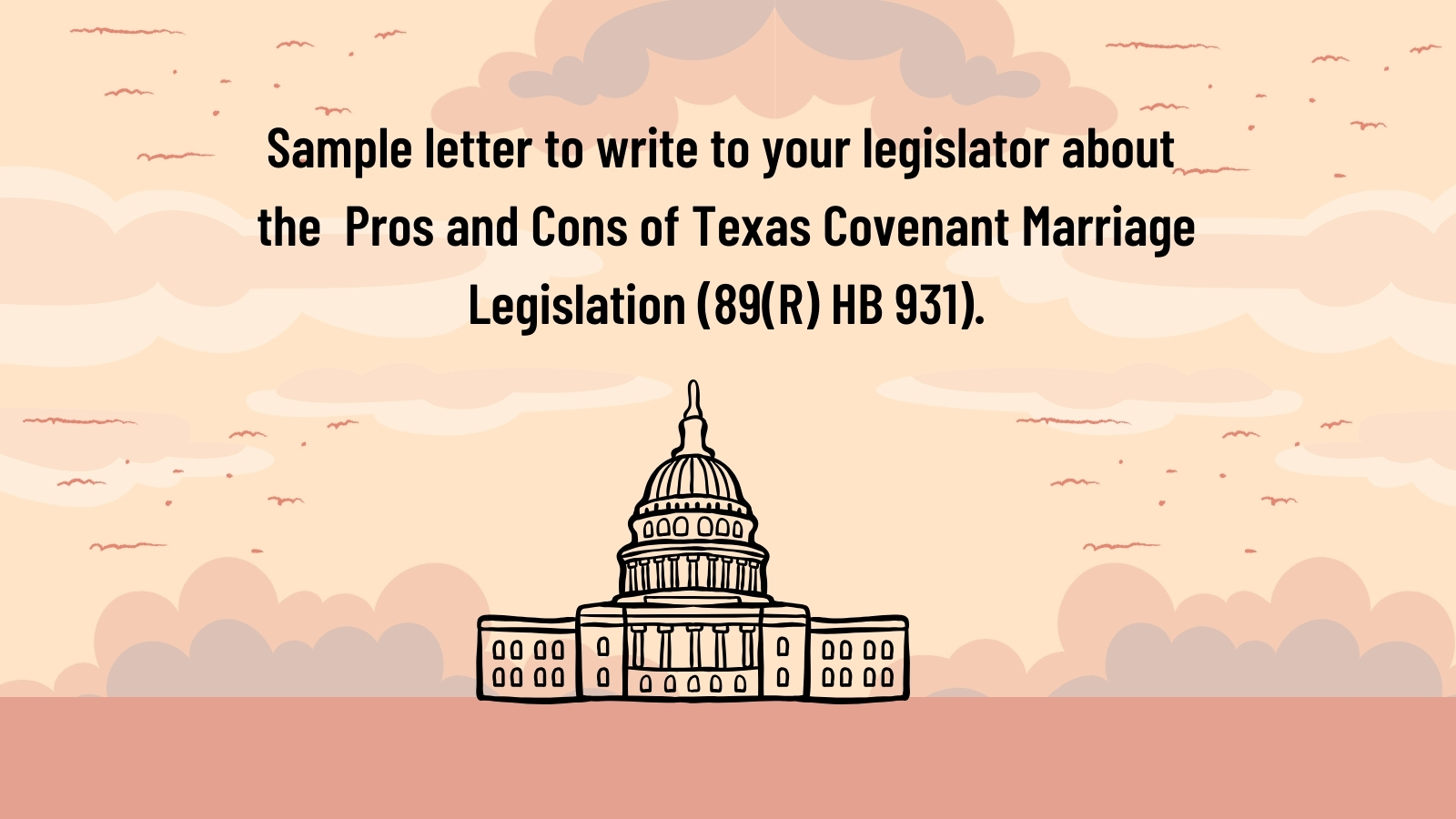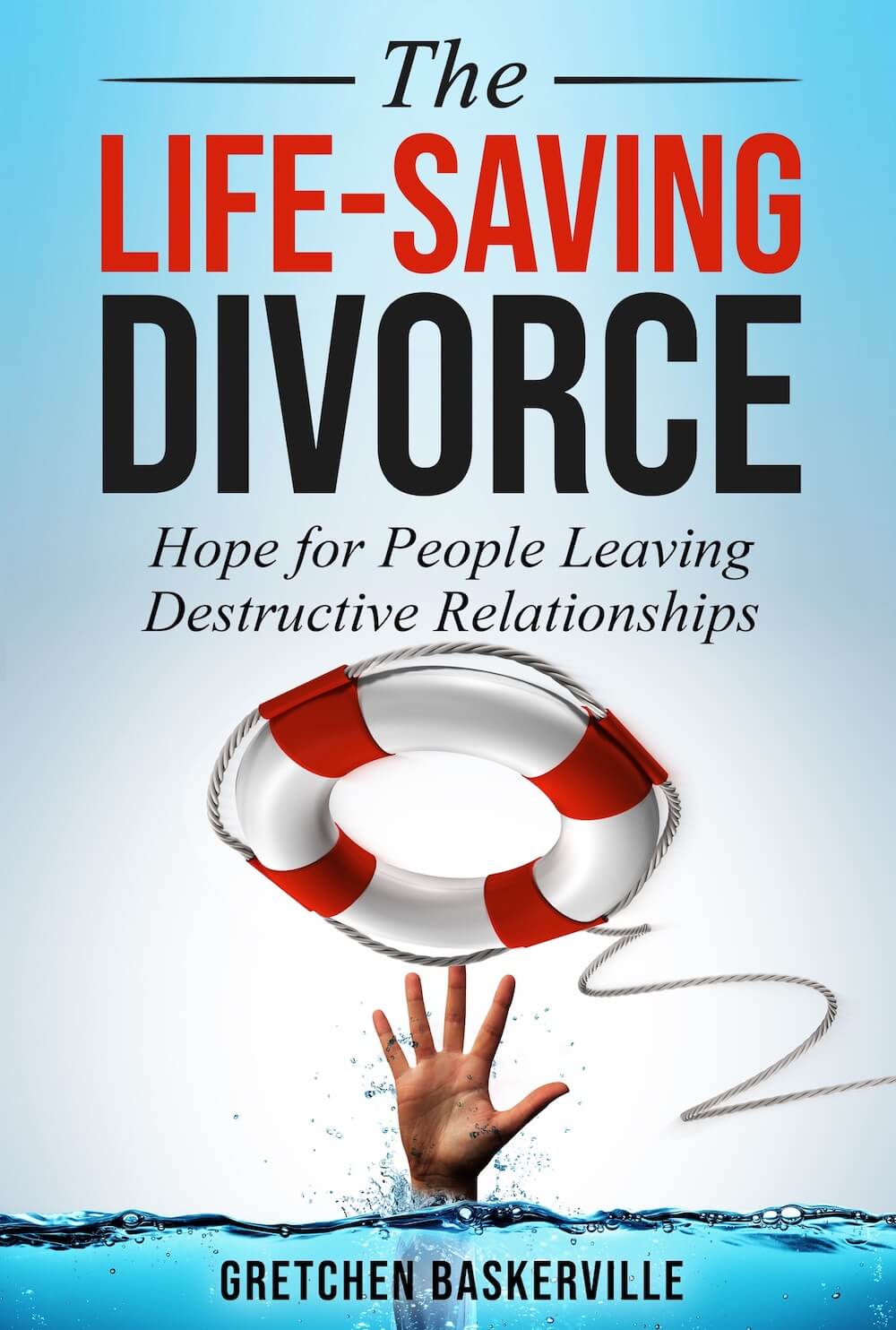See below for a Sample Letter to Address the Pros and Cons of Texas Covenant Marriage Legislation (89(R) HB 931).
The bill has some good features, but it makes it difficult to divorce for verbal and emotional abuse, drug or alcohol addictions, and compulsive behaviors such as gambling and pornography. It even sets the bar very high to divorce for prostitution or pedophilia. Link to bill HERE.
Background: This bill was filed Nov. 12, 2024, by Texas Representative Cody Vasut. HB 931 was prefiled during the prefiling period leading up to the 89th Legislative Session, which begins in January 2025. To track the current status, go to this State of Texas legislature website: https://capitol.texas.gov/BillLookup/BillStages.aspx?LegSess=89R&Bill=HB931. Vasut also filed a bill (HB732) seeking to repeal a section of the Texas Family Code that permits the annulment of marriages on the grounds of “impotence.”
———— SAMPLE LETTER for Texas residents TO WRITE TO YOUR TEXAS STATE REPRESENTATIVES ———–
ADD YOUR OWN STORY (see option below) AND CHANGE USING YOUR VOICE AND STYLE OF WRITING.
[Your Name]
[Your Address]
[City, State, ZIP Code]
[Date]
[Lawmaker’s Name — find their name and address by going to https://wrm.capitol.texas.gov/home]
[Their Title, e.g., State Senator or Representative]
[Address]
[City, State, ZIP Code]
Dear [Lawmaker’s Name],
Subject: Please modify or reject the Texas Covenant Marriage Legislation (89(R) HB 931).
As a Texas resident, I’m writing to share my thoughts on HB 732, the Texas Covenant Marriage bill. While I understand the goal of encouraging strong, lasting marriages, I have concerns about how the bill could affect people in difficult situations.
Here are some points to consider:
Possible Pros of Covenant Marriage
- Encourages Commitment:
Covenant marriage emphasizes the sanctity of marriage and lifelong commitment, appealing to Christians and other religious conservatives who prioritize stable family life and view marriage as a sacred bond.
Covenant marriage requires extra steps like premarital counseling, which can help couples build a strong foundation for their relationship. It also promotes the idea that marriage is a lifelong commitment, which is important to many people of faith.
- Strengthens Community Values:
- By incorporating stricter legal requirements and counseling, covenant marriage aligns with faith-based principles, promoting the idea that marriage should be entered into with careful deliberation and accountability.
Cons of Covenant Marriage
- Hard to Leave Harmful Marriages:
The bill makes divorce harder by only allowing it for certain reasons like adultery, physical abuse, or abandonment. But what about other serious issues like verbal or emotional abuse, prostitution, substance addiction, neglect, or severe indifference, which are not covered under the definition of Family Violence (Section 71.004) of the Texas Family Code?
[OPTIONAL: Share your story in 50-100 words.] - Verbal and Emotional Abuse May Be Harder to Prove:
Emotional abuse can be as damaging as physical abuse, but it’s not easy to prove in court. Physical abuse leaves evidence (e.g., medical records, police reports) that substantiate claims of harm. But with emotional abuse, there may be less concrete evidence. Those victims might not escape dangerous situations. Spouses enduring issues like compulsive behaviors (e.g., gambling, pornography, or pedophilia), neglect, or toxic environments might struggle to meet the bill’s requirements for separation or reconciliation. Emotional or psychological abuse must be specifically mentioned as a ground for divorce in the bill; otherwise, it gives malicious spouses the upper hand legally. - Delays and Costs:
The bill adds steps like mandatory counseling and waiting periods, which could make it take longer and cost more to get a divorce. This can cause extra stress for families already struggling. Additional legal hurdles and mandatory separation periods could overburden the courts while prolonging emotional and financial strain on families.
Final Thoughts
While HB 732 has good intentions, it might cause problems for people who find themselves later in difficult or dangerous marriages. I hope the bill can either be changed to include more reasons for divorce, adjust the bar of evidence, or be rejected.
Thank you for listening to my concerns.
Sincerely,
[Your Name]
[Your Contact Information]



 :
:
 Buy PDF
Buy PDF